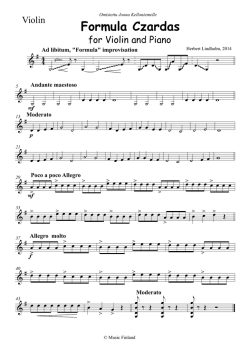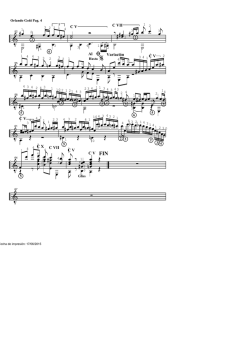
Tomaso Albinoni Adagio
Tomaso Albinoni Adagio Transcription for guitar by Mauro Henrique Pavanelli [email protected] www.mpavanelli.com Biographical note: Tomaso Albinoni, oldest son of a wealthy paper merchant, was born in Venice in 1671. At an early age he became proficient as a singer and, more notably, as a violinist, soon turning his hand to composition. Until his father's death in 1709, he was able to cultivate music more for pleasure than for profit, referring to himself as “dilettante”, - a term which in 18th century Italy was totally devoid of unfavorable connotations. Under the terms of his father's will he was relieved of the duty (which he would normally have assumed as oldest son) to take charge of the family business, and this task devolved on to his younger brothers. Henceforth he was to be a full-time musician, who according to one report, at one time ran a successful academy of singing. He resided in Venice all his life, though visits to Florence (1703) and Munich (1722) are recorded. After a long period of inactivity he died in 1751. In his youth Albinoni flirted unsuccessfully with the composition of church music. He first came to public notice as a composer when, in 1694, his first opera, “Zenobia, regina de Palmireni”, was produced in Venice and his first collection of instrumental music (“Sonata a tre, op.1”) appeared. Thereafter he divided his attention almost equally between vocal composition (operas, serenatas and cantatas) and instrumental composition (sonatas and concertos). His vocal music circulated only in manuscript, apart from twelve cantatas published in 1702 as his op.4 and one cantata that appeared elsewhere, and was comparatively little known outside Italy. His instrumental music (108 works published as op. 1-3 and 5-10, plus 17 works published in unauthorized; collections and about 50 authenticated works remaining in manuscript) enjoyed a vogue in northern Europe, particularly through the activity of publishing houses in Amsterdam and London. The Albinoni´s Adagio This peace is based on a fragment of manuscript discovered in the Dresden State Library after the Second World War by Remo Giazotto, a Milanese musicologist who was at that time completing his biography of Albinoni and his listing of Albinoni's music. Only the bass line and six bars of melody had survived, possibly from the slow movement of a Trio Sonata. Giazotto "reconstructed" the now-famous Adagio in about 1945, based on the surviving fragment. CTpmp!Hvjubs!Tpdjfuz www.mpavanelli.com Adagio Transcription for guitar by: Mauro Henrique Pavanelli [email protected] Brasil - 2002 Guitar # 3 g ˙ .. & 4 ggg ˙˙œ . œ œ 2 5 L # g ˙˙ .. & ggg ˙œ . 2 5 8 L j 42 3 œ gœ œ ˙ ggg # œ ggg # œ œ œ g 1 # g œœ œ ˙ & ggg gg œ œ 5 gg ˙˙˙ ... gœ œ œ 2g 5 L œ œ œ. œ œ. C7 ____-____________________ œ # gggg & gg ˙ . 11 1 4 3 . œ 17 # ggg œœ .. 1 & ggg œ . g 52 L # gggg ˙˙ & ggg ˙ gg g˙ 20 œ œ œ œ œ 3 4 3 2 C Copyright Solo Guitar Society http://www.mpavanelli.com 1 3 L 2 1 L 4 œ. gg œœ ggg œœ g 4 1 3 œ œ ≈ œ 4 U r œœ œ œ ggg œ . gg œ .. ggg œœ . ggg g˙ . U œ gg œœ .. Œ 1 1 4 1 0 2 0 3 5 LL 2 œ œ. Œ 2 2 4 1 L L gœ 3 1 œ œ œ œ œ C5 ___________-_________ ggg œ 3 ggg œ 41 L œ œ1 œ2 4œ œ2 œ1 œœ œ œ3 4 1 3 œ gg œ ggg œœœ g2 œ œ œ1 œ2 œ1 L ................................. œ . 2 1 2 4 C2 2 1 3 3 r œ ggg œœœ g L œ 4 j 3 0 2 œ gg œ œ œ j œ #œ. gg œ œ ggg œ œ œ. œ 1 J œ œ. Œ Œ gg œœ ... 43 2 ggg œ 1 gg œ5. 2 gg œœœ 4 gg 3 gg œœœ g 3 gg œœ gg œœ gg 5 œ gg œ .. 1 gg œ˙ . gg gg ˙ .2 C5 ____-______ 2 œ # ggg & ggg œ 14 1 1671@- 1751< j œ gg ˙˙ .. gg ˙ . œ gg œ2 ggg œ œ ˙ ggg œœ œ 2 1 C5 ____-__________________ 4 3 Tomaso Albinoni 4 1 3 2 gg œ 3 gg œ gg œ ggg 2 gœ œ 4 2 œ 23 gg œ 1 gg œ 4 ggg ggg œ ggg œ 2 1 3 1 œ1 # œ1 œ gg n œ œ œ 3œ n œ . œ œ gg # œœ œœ gg œ œ œ .. 2 -1- 4 # gœ & ggg œœ gg œ 23 26 # & gg œœ ggg gœ 1 3 2 3 œ œ 0 1 ggg œ œ ggg œœ 2 0 1 3 gg œœ ggg œ gg œ 1 LL œ œ œ . œ œ g# œœ gg œ6 œ. L 3 1 3 1 3 1 4 1 4 2 4 1 2 4 5 # œ œœœœ œœœœ ˙ œ # œ œ gggg # ˙˙ 421 & gg ˙˙ ˙. 29 32 & 3 L 1 3 1 3 1 4 1 4 C5 œ____________________œ # œœœ & 41 & œ œ œ œœœœ 2 ˙4 3 2 2 KKr œ gg œœ gg œ gg œ 4 2 3 # 2 Kr œ gg œœ ggg œœ gg œ gœ 4 2 1 2 24 2 4 2 1 2 0 3 2 3 nœ œ œ 4 2 1 2 œ œ œ œ œ #œ œ œ. # 3 4 2 2 Copyright Solo Guitar Society http://www.mpavanelli.com 1 3 1 3 2 4 2 3 1 0 1 3 2 3 ggg œœ .. ggg# œœœ ... gg œ . C5 ggg# œœœ ggg gg œ c7 1 4 gg œœ gg n œœ 2 g 64 L c7 ______ œ œ œ œ œ œ œ œ1 2œ # œ1 œ1 œ2 g # 3œ œ ˙ gg œ gg œ & gg ggg œ œ C 47 4 œœ .. œ .. œ 1 0 œ œ œ # œ4 . 0œ . J 0 c10 2 4 gg n œœœ ... 32 gg ggg œ . g 1 œœ J 1 rK b œ œ #Lœ œ 4 2 2 1 1 Kr 2 1 œ œ b œ œ # œ4 œ1 J nœ œ œ œœœ j œ nœ œ nœ œ œ œ œ 3 0 œ 0 n œ1 œ0 0 0 3 2 4 1 4 2 1 2 0 3 2 3 4 1 1 2 4 3 4 2 4 1 c1 ________________________________________ 4 2 3 2 3 c1 ___ C5 ______________ 1 3 j œ œ œ #œ. œ. c5 ______________ 3 Kr2 œ 4 œ œ œœœœ œ œ œ j œœœ œ œ œ œ œ 4 œ .4 n ˙ œ œ # œ nœ œ œ œ œ œ & 1 44 1 3 2 œ œ œ. œ œ œ. œ œ œ . 2œ œ1 gg œ .. gg œœ˙ . gg ˙ .. œ. ggg ˙ . 1 L .......................... L ............. œ œ 2 3 ............. 1 3 gggn œœ gg œ gn œ 2 4 L .......................... L ...... # œ n œ œ œ œ œœ œ œ œ œ œ œ # œ œ ˙ 1 0 1 4 & 1 4 2 1 # œ œœœœ œœœœ œ œ #œ œ. 35 38 1 2 œ œ œ ggg œœœ gg gg œ L c1 4 -2- 1 3 2 c7 gg# œœœ ... 2 gg œœ .. ggg œ . 3 g C5 œ œ gg œœ gg œ gg ggg œ œ œ1 J Œ œ œ œ3 4 Œ œ C5 __________________________________________________ # gg œœœ & gg œ Œ œ # gg n œœœ 2 & ggg œ 5 3 Œ œ L 50 43 53 Œ œ C5 _______________________ L 3 1 3 Œ œ # ®œ œ œ. œ. & œ œ 5 2 L 56 59 # 3 & ggg œ g˙2 # ggg œ . & ggg gg ˙ . 62 œ 2 4 # gg œœ 1 & ggg œ gœ 3 œ # gg œ & ggg œœ 2 gg œ 1 3 71 4 2 1 3 2 # œ & œœ œ C œ2 œ1 œ 4 2 3 # & ˙˙ ˙2 74 0 gg œœ g Lœ 4 2 3 œ gg # # œœ ggg œ g 1 Copyright Solo Guitar Society http://www.mpavanelli.com L 43 1 gg œœœ gg # œ gg 1 ggg gg g œ œœ œ ®œ3 4œ œ . œ . nœ œ Œ œ 3 L gg œ L œ L 1 ggg n œ ggg ˙ gg œœœ gg ggg œ 0 ggg œœ 3 gg œ gg œ 1 4 œœ œ #œ gg# # œœœ gg ggg œ 1 Œ Œ œ 3 œ 1 0 gg œ . œ œ . gg ggg ˙ 0 0 œ œ1 œœ œ gg œœ g 4 3 gg œ gg œ gg œ2 œ gg œœœ ggg ggg œ œ œ -3- œ. ˙ œ 4 œ 3 4 3 3 œ œ. œ1 œ U gg œœœ 2 gg 3 n œ1 œ œ œ1 œ3 ggg œœ .. 3 ggg œ . gœ . 1 c7 ________________________ 4 œ gg œœœ 0 gg gg ggg œ 0 gg gg œ 0 g j œ L ............. 1 œ gg œ gg œ 3 1 2 3 2 œ 2 3 ®œ œ œ. ˙ # œ5 1 œ 1 c5 _____________________ 2 3 1 œ4 2 4 Œ œ ®œ œ œ . ˙ œ0 œ œ # œ g œœ œ ggg œ gg ggg ggg œ ggg œ g 6 1 3 U1 ng œœ 2 g ggg # œ gg œœ g ggg œ 0 g 3 œ œ n 1œ 3œ œ 4 65 68 1 gg œœœ gg œ c8 _______________________ ggg œœœ ggg gg œ L 4 22 ggg œœœ 2 1 4 3 gg # œœ 2 gggn œœ g 1 œ gœ ggg œœ ggg gœ gg œœ ggg gg œ œ3 gg œœœ g œ œ œœœ gg œœ ggg œ g œ0 œ 1 œ C5 ______________________ 4 ˙ ggg œœ œ ggg œ œ 3 œ j œ 4 2 3 # gg # œœ œ ˙ & ggg gg # œ 1 œ g 77 4 4 j 32 0 3 œ gg œ œ œ j ggg œ œ œ #œ. gg œ œ œ. œ 1 J gg œœ ... ggg œ ggg œ . 4 œ œ œ œ œ œ & œ œ œ œ3 œ œ œ œ 3 œ œ œ 2 2 4 80 # C Copyright Solo Guitar Society http://www.mpavanelli.com -4- 1 2 3 j œ œ œ œ œ 12 harm. 4 œ 2 œœ L OO
© Copyright 2026
![Manic Waltz [dac072] - Free](http://s2.esdocs.com/store/data/000482668_1-e14e824d701b488143f0f8a3a4ef4b49-250x500.png)

